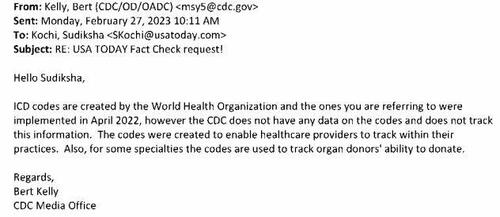
Authored by Zachary Stieber via The Epoch Times (emphasis ours),
Medical codes introduced during the COVID-19 pandemic to show when people are unvaccinated or undervaccinated for COVID-19 are being used to track people, the top U.S. public health agency has confirmed.
The U.S. Centers for Disease Control and Prevention (CDC) made the confirmation in emails that The Epoch Times obtained through a Freedom of Information Act request.
The CDC had said in documents and public statements that the goal of the new codes, in the International Classification of Diseases (ICD) system, was “to track people who are not immunized or only partially immunized.”
The CDC now says it does not have access to the data, but that health care systems do.
“The ICD codes were implemented in April 2022, however the CDC does not have any data on the codes and does not track this information,” CDC officials said in the emails.
“The codes were created to enable healthcare providers to track within their practices,” the officials added.
The emails were sent to news outlets. The CDC has not answered queries from The Epoch Times about the codes, which the CDC added to the U.S. ICD system in 2022.

How Providers Are Using the Codes
The CDC proposed the codes in 2021. “There has been interest expressed in being able to track people who are not immunized or who are only partially immunized,” Dr. David Berglund, a CDC medical officer, said during a meeting about the proposal.
One code is for being “unvaccinated for COVID-19.” Another is for being partially vaccinated, or not having received a primary series of a COVID-19 vaccine.
In comments to the CDC about the proposal, health care providers said they supported adding the codes—with some detailing how they’d be used.
Identifying people who are unvaccinated or undervaccinated for COVID-19 “will help health insurance providers identify emollees [sic] who may benefit from outreach and further education about vaccination,” Danielle Lloyd, a senior vice president at America’s Health Insurance Plans (AHIP), and Adam Myers, senior vice president at the Blue Cross Blue Shield Association, said in a joint letter to the CDC.
“Creating ICD-10 codes that can be tracked via claims would provide health insurance providers key information to help increase immunization rates,” they added.
In another missive, Nancy Andersen, a director with Kaiser Permanente Health Plan and Hospitals, and Erica Eastham, executive director at The Permanente Federation LLC, told the CDC: “These codes provide valuable data for understanding immunization rates and for follow-up with under-immunized patients.”
Andersen and Eastham urged the CDC to advise providers entering one of the new codes to also enter an additional code indicating why a person was unvaccinated or undervaccinated, with reasons including due to a contraindication or due to “belief or group pressure.”
The comments were obtained by The Epoch Times through the Freedom of Information Act.
Most of the providers and other health care groups, including the American Health Information Management Association (AHIMA) that commented did not respond to inquiries.
AHIP declined to say what education it offered to people tracked through the new codes. A spokeswoman pointed to a Feb. 28, 2022, article that outlines steps providers have taken to promote vaccination.
The codes are part of the ICD’s 10th edition. The World Health Organization of the United Nations holds the copyright for ICD-10 but has allowed the U.S. government to adopt the edition, according to the CDC. The new codes are not part of the World Health Organization’s ICD.
All health care entities covered by the Health Insurance Portability and Accountability Act must use the U.S. version of the ICD. The U.S. version is updated at least once a year. Coded ICD data from providers enable public health officials to “conduct many disease-related activities,” according to the CDC. Purposes include enabling a doctor seeing a new patient to easily retrieve the patient’s medical history.
Read more here...
Authored by Zachary Stieber via The Epoch Times (emphasis ours),
Medical codes introduced during the COVID-19 pandemic to show when people are unvaccinated or undervaccinated for COVID-19 are being used to track people, the top U.S. public health agency has confirmed.
The U.S. Centers for Disease Control and Prevention (CDC) made the confirmation in emails that The Epoch Times obtained through a Freedom of Information Act request.
The CDC had said in documents and public statements that the goal of the new codes, in the International Classification of Diseases (ICD) system, was “to track people who are not immunized or only partially immunized.”
The CDC now says it does not have access to the data, but that health care systems do.
“The ICD codes were implemented in April 2022, however the CDC does not have any data on the codes and does not track this information,” CDC officials said in the emails.
“The codes were created to enable healthcare providers to track within their practices,” the officials added.
The emails were sent to news outlets. The CDC has not answered queries from The Epoch Times about the codes, which the CDC added to the U.S. ICD system in 2022.

How Providers Are Using the Codes
The CDC proposed the codes in 2021. “There has been interest expressed in being able to track people who are not immunized or who are only partially immunized,” Dr. David Berglund, a CDC medical officer, said during a meeting about the proposal.
One code is for being “unvaccinated for COVID-19.” Another is for being partially vaccinated, or not having received a primary series of a COVID-19 vaccine.
In comments to the CDC about the proposal, health care providers said they supported adding the codes—with some detailing how they’d be used.
Identifying people who are unvaccinated or undervaccinated for COVID-19 “will help health insurance providers identify emollees [sic] who may benefit from outreach and further education about vaccination,” Danielle Lloyd, a senior vice president at America’s Health Insurance Plans (AHIP), and Adam Myers, senior vice president at the Blue Cross Blue Shield Association, said in a joint letter to the CDC.
“Creating ICD-10 codes that can be tracked via claims would provide health insurance providers key information to help increase immunization rates,” they added.
In another missive, Nancy Andersen, a director with Kaiser Permanente Health Plan and Hospitals, and Erica Eastham, executive director at The Permanente Federation LLC, told the CDC: “These codes provide valuable data for understanding immunization rates and for follow-up with under-immunized patients.”
Andersen and Eastham urged the CDC to advise providers entering one of the new codes to also enter an additional code indicating why a person was unvaccinated or undervaccinated, with reasons including due to a contraindication or due to “belief or group pressure.”
The comments were obtained by The Epoch Times through the Freedom of Information Act.
Most of the providers and other health care groups, including the American Health Information Management Association (AHIMA) that commented did not respond to inquiries.
AHIP declined to say what education it offered to people tracked through the new codes. A spokeswoman pointed to a Feb. 28, 2022, article that outlines steps providers have taken to promote vaccination.
The codes are part of the ICD’s 10th edition. The World Health Organization of the United Nations holds the copyright for ICD-10 but has allowed the U.S. government to adopt the edition, according to the CDC. The new codes are not part of the World Health Organization’s ICD.
All health care entities covered by the Health Insurance Portability and Accountability Act must use the U.S. version of the ICD. The U.S. version is updated at least once a year. Coded ICD data from providers enable public health officials to “conduct many disease-related activities,” according to the CDC. Purposes include enabling a doctor seeing a new patient to easily retrieve the patient’s medical history.
Read more here…
Loading…





